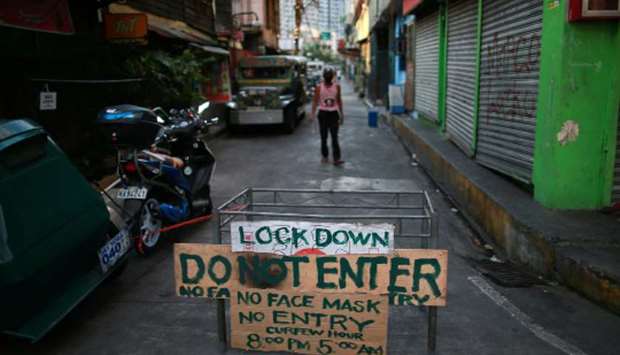At least three doctors have died in the fight against the new coronavirus in the Philippines, where thousands of medical workers are treating Covid-19 patients despite a lack of protective gear, officials said yesterday.
Several other doctors were reportedly in critical condition, while hundreds of healthcare workers were in quarantine after being exposed to the virus in various hospitals in Manila, according to hospitals and colleagues.
“Three of our doctors have died and a number of them are in critical condition due to the coronavirus,” presidential spokesman Salvador Panelo said in a statement.”An increasing number of Filipinos are succumbing to the deadly disease.”
VIRUS CASES
RISE TO 462
The number of confirmed cases of Covid-19 — the respiratory illness caused by coronavirus — in the Philippines rose to 462 yesterday, after the Department of Health reported 82 new cases, including 33 deaths, Health Undersecretary Maira Rosario Vergeire said. It is not clear if the three doctors were included in the death toll.
The three doctors — a cardiologist, an anaesthesiologist and an oncologist — were infected while treating patients in three different hospitals in Manila, according to the Philippine Medical Association and the hospitals.
“Everyone’s tired but we have no choice, we chose this work,” said Antonio Ramos, a doctor and administrative service manager at the Lung Center of the Philippines. “We cannot even spare time to mourn our friends.”
Ramos called for donations for personal protective gear for all hospitals dealing with Covid-19, noting that supply has run out in other facilities.
“We are seeing that at the end of the month, we will have nothing,” he told Manila radio station DZMM. “We are improvising but that’s a breach in protocols and that’s why doctors are getting sick.”
In one hospital in Laguna province, south of Manila, doctors and nurses used garbage bags and plastic bags as protective gear to cover their heads, hands, feet and bodies.
Other doctors have suggested using shower caps, ponchos and disposable plastic gloves as alternative protective gear.
“It’s very difficult for hospitals to buy PPEs (personal protective equipment). We are dependent on donors,” said Karl Henson, an infectious disease specialist and head of the infection control and epidemiology centre of The Medical City.
“If you can’t protect your healthcare workers, they can’t adequately take care of patients,” he said in an interview.
Henson added that the government should work on getting more testing kits so that more people can know if they have been infected.
“What we are doing now in the Philippines is sending home patients under investigation with mild symptoms, not testing them,” he said.
“We are only testing moderate-to-severe cases.”
“We really should be testing anyone who’s symptomatic so that we can...make sure that, if you are positive, we need to check your contacts, and if they are symptomatic, we can test and isolate them,” he added.
“It’s really the only way for us to break the transmission chain.”

A makeshift barricade blocks a street from outsiders to protect a neighbourhood from the spread of coronavirus disease (Covid-19) in Manila, yesterday.
